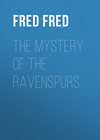Buch lesen: «The Slave of Silence»
CHAPTER I
The girl turned away from the splendour of it and laid her aching head against the cool windowpane. A hansom flashed along in the street below with just a glimpse of a pretty laughing girl in it with a man by her side. From another part of the Royal Palace Hotel came sounds of mirth and gaiety. All the world seemed to be happy, to-night, perhaps to mock the misery of the girl with her head against the windowpane.
And yet on the face of it, Beatrice Darryll's lines seemed to have fallen in pleasant places. She was young and healthy, and, in the eyes of her friends, beautiful. Still, the startling pallor of her face was in vivid contrast with the dead black dress she wore, a dress against which her white arms and throat stood out like ivory on a back-ground of ebony and silver. There was no colour about the girl at all, save for the warm, ripe tone of her hair and the deep, steadfast blue of her eyes. Though her face was cold and scornful, she would not have given the spectator the impression of coldness, only utter weariness and a tiredness of life at the early age of twenty-two.
Behind her was a table laid out for a score of dinner guests. Everything was absolutely perfect and exceedingly costly, as appertained to all things at the Royal Palace Hotel, where the head waiter condescended to bow to nothing under a millionaire. The table decorations were red in tone, there were red shades to the low electric lights, and masses of red carnations everywhere. No taste, and incidentally no expense had been spared, for Beatrice Darryll was to be married on the morrow, and her father, Sir Charles, was giving this dinner in honour of the occasion. Only a very rich man could afford a luxury like that.
"I think everything is complete, madame," a waiter suggested softly. "If there is anything – "
Beatrice turned wearily from the window. She looked old and odd and drawn just for the moment. And yet that face could ripple with delighted smiles, the little red mouth was made for laughter. Beatrice's eyes swept over the wealth of good taste and criminal extravagance.
"It will do very nicely," the girl said. "It will do – anything will do. I mean you have done your work splendidly. I am more than satisfied."
The gratified, if slightly puzzled, waiter bowed himself out. The bitter scorn in Beatrice's eyes deepened. What did all this reckless extravagance mean? Why was it justified? The man who might have answered the question sauntered into the room. A wonderfully well-preserved man was Sir Charles Darryll, with a boyish smile and an air of perennial youth unspotted by the world, a man who was totally unfitted to cope with the hard grip and sordid side of life. There were some who said that he was a grasping, greedy, selfish old rascal, who under the guise of youthful integrity concealed a nature that was harsh and cruel.
"Well, my dear child," Sir Charles cried. "And are you not satisfied? That table-setting is perfect; I never saw anything in more exquisite taste."
"It will all have to be paid for," Beatrice said wearily. "The money – "
"Will be forthcoming. I have no doubt of it. Whether I have it at the bank or not I cannot for the moment say. If not, then our good friend Stephen Richford must lend it me. My dear child, that black dress of yours gives me quite a painful shock. Why wear it?"
Beatrice crossed over and regarded her pale reflection in the glass opposite. The little pink nails were dug fiercely into the still pinker flesh of her palm.
"Why not?" she asked. "Is it not appropriate? Am I not in the deepest mourning for my lost honour? To-morrow I am going to marry a man who from the bottom of my heart I loathe and despise. I am going to sell myself to him for money – money to save your good name. Oh, I know that I shall have the benediction of the church, less fortunate girls will envy me; but I am not a whit better than the poor creature flaunting her shame on the pavement. Nay, I am worse, for she can plead that love was the cause of her undoing. Father, I can't, can't go through with it."
She flung herself down in a chair and covered her face with her hands. The boyish innocence of Sir Charles's face changed suddenly, a wicked gleam came into his eyes. His friends would have found a difficulty in recognizing him then.
"Get up," he said sternly. "Get up and come to the window with me. Now, what do you see in this room?"
"Evidences of wealth that is glittering here," Beatrice cried. "Shameless extravagance that you can never hope to pay for. Costly flowers – "
"And everything that makes life worth living. All these things are necessary to me. They will be with me till the end if you marry Stephen Richford. Now look outside. Do you see those two men elaborately doing nothing by the railings opposite. You do? Well, they are watching me. They have been dogging me for three days. And if anything happened now, a sudden illness on your part, anything to postpone to-morrow's ceremony, I should pass the next day in jail. You did not think it was as bad as that, did you?"
The man's face was livid with fury; he had Beatrice's bare arm in a cruel grip, but she did not notice the pain. Her mental trouble was too deep for that.
"It's that City Company that I hinted at," Sir Charles went on. "There was a chance of a fortune there. I recognized that chance, and I became a director. And there was risk, too. We took our chance, and the chance failed. We gambled desperately, and again fortune failed us. Certain people who were against us have made unhappy discoveries. That is why those men are watching me. But if I can send the chairman a letter to-morrow assuming innocence and regret and enclosing a cheque for £5,000 to cover my fees and to recover all the shares I have sold, then I come out with a higher reputation than ever. I shall shine as the one honest man in a den of thieves. That cheque and more, Richford has promised me directly you are his wife. Do you understand, you sullen, white-faced fool? Do you see the danger? If I thought you were going to back out of it now, I'd strangle you."
Beatrice felt no fear; she was long past that emotion. Her weary eyes fell on the banks of red carnations; on the shaded lights and the exquisite table service. The fit of passion had left her indifferent and cold. She was not in the least sullen.
"It would be the kindest act you could do, father," she said. "Oh, I know that this is no new thing. There is no novelty in the situation of a girl giving herself to a man whom she despises, for the sake of his money. The records of the Divorce Court teem with such cases. For the battered honour of my father I am going to lose my own. Be silent – no sophistry of yours can hide the brutal truth. I hate that man from the bottom of my soul, and he knows it. And yet his one desire is to marry me. In Heaven's name, why?"
Sir Charles chuckled slightly. The danger was past, and he could afford to be good-humoured again. Looking at his daughter he could understand the feelings of the lover who grew all the more ardent as Beatrice drew back. And Stephen Richford was a millionaire. It mattered little that both he and his father had made their money in crooked ways; it mattered little that the best men and a few of the best clubs would have none of Stephen Richford so long as Society generally smiled on him and fawned at his feet.
"You need have no further fear," Beatrice answered coldly. "My weakness has passed. I am not likely to forget myself again. My heart is dead and buried – "
"That's the way to talk," Sir Charles said cheerfully. "Feeling better, eh? I once fancied that that confounded foolishness between Mark Ventmore and yourself, – eh, what?"
A wave of crimson passed over Beatrice's pale face. Her little hands trembled.
"It was no foolishness," she said. "I never cared for anyone but Mark, I never shall care for anybody else. If Mark's father had not disowned him, because he preferred art to that terrible City, you would never have come between us. But you parted us, and you thought that there was an end of it. But you were wrong. Let me tell the truth. I wrote to Mark in Venice, only last week, asking him to come to me. I got no reply to that letter. If I had and he had come to me, I should have told him everything and implored him to marry me. But the letter was not delivered, and therefore you need have no fear of those men in the street. But my escape has been much nearer than you imagine."
Sir Charles turned away humming some operatic fragment gaily. There was not the least occasion for him to give any display of feeling in the matter. It had been an exceedingly lucky thing for him that the letter in question had miscarried. And nothing could make any difference now, seeing that Beatrice had given her word, and that was a thing that she always respected. All Beatrice's probity and honour she inherited from her mother.
"Very foolish, very foolish," Sir Charles muttered benignly. "Girls are so impulsive. Don't you think that those carnations would be improved by a little more foliage at the base? They strike me as being a little set and formal. Now, is not that better?"
As if he had not either care or trouble in the world, Sir Charles added a few deft touches to the deep crimson blooms. His face was careless and boyish and open again. From the next room came the swish of silken skirts and the sound of a high-bred voice asking for somebody.
"Lady Rashborough," Sir Charles cried, "I'll go and receive her. And do for goodness' sake try to look a little more cheerful. Stay in here and compose yourself."
Sir Charles went off with an eager step and his most fascinating smile. Lord Rashborough was the head of his family. He was going to give Beatrice away to-morrow; indeed, Beatrice would drive to the church from Rashborough's town house, though the reception was in the Royal Palace Hotel.
Beatrice passed her hand across her face wearily. She stood for a moment looking into the fire, her thoughts very far away. Gradually the world and its surroundings came back to her, and she was more or less conscious that somebody was in the room. As she turned suddenly a tall figure turned also, and made with hesitation towards the door.
"I am afraid," the stranger said in a soft, pleading voice; "I am afraid that I have made a mistake."
"If you are looking for anybody," Beatrice suggested, "my father has these rooms. If you have come to see Sir Charles Darryll, why, I could – "
It struck Beatrice just for a moment that here was an adventurer after the silver plate. But a glance at the beautiful, smooth, sorrowful face beat down the suspicion as quickly as it had risen. The intruder was unmistakably a lady, she was dressed from head to foot in silver grey, and had a bonnet to match. In some vague way she reminded Beatrice of a hospital nurse, and then again of some grande dame in one of the old-fashioned country houses where the parvenue and the Russo-Semitic financier is not permitted to enter.
"I took the wrong turn," the stranger said. "I fancy I can reach the corridor by that door opposite. These great hotels are so big, they confuse me. So you are Beatrice Darryll; I have often heard of you. If I may venture to congratulate you upon – "
"No, no," Beatrice cried quickly. "Please don't. Perhaps if you tell me your name I may be in a position to help you to find anybody you may chance – "
The stranger shook her head as she stood in the doorway. Her voice was low and sweet as she replied.
"It does not in the least matter," she said. "You can call me the Slave of the Bond."
CHAPTER II
The guests had assembled at length, the dinner was in full swing. It would have been hard for any onlooker to have guessed that so much misery and heart-burning were there. Sir Charles, smiling, gay, debonair, chatted with his guests as if quite forgetful of the silent watchers by the railings outside. He might have been a rich man as he surveyed the tables and ordered the waiters about. True, somebody else would eventually pay for the dinner, but that detracted nothing from the host's enjoyment.
Beatrice had a fixed smile to her face; she also had disguised her feelings marvellously. There were other girls bidden to that brilliant feast who envied Miss Darryll and secretly wondered why she was dressed so plainly and simply. On her left hand sat Stephen Richford, a dull, heavy-looking man with a thick lip and a suggestion of shiftiness in his small eyes. Altogether he bore a strong resemblance to a prize-fighter. He was quiet and a little moody, as was his wont, so that most of Beatrice's conversation was directed to her neighbour on the other side, Colonel Berrington, a brilliant soldier not long from the East.
A handsome and distinguished-looking man he was, with melancholy droop to his moustache and the shadow of some old sorrow in his eyes. Colonel Berrington went everywhere and knew everything, but as to his past he said nothing. Nobody knew anything about his people and yet everybody trusted him, indeed no man in the Army had been in receipt of more confidences. Perhaps it was his innate feeling, his deep sense of introspection. And he knew by a kind of instinct that the beautiful girl by his side was not happy.
"So this is your last free party, Miss Beatrice," he smiled. "It seems strange to think that when last we met you were a happy child, and now – "
"And now an unhappy woman, you were going to suggest," Beatrice replied. "Is not that so?"
"Positively, I refuse to have words like that put into my mouth," Berrington protested. "Looking round the table I can see four girls at least who are envying you from the bottom of their hearts. Now could any society woman be miserable under those circumstances?"
Beatrice flushed a little as she toyed nervously with her bread. Berrington's words were playful enough, but there was a hidden meaning behind them that Beatrice did not fail to notice. In a way he was telling her how sorry he was; Richford had been more or less dragged into a sporting discussion by the lady on the other side, so that Beatrice and her companion had no fear of being interrupted. Their eyes met for a moment.
"I don't think they have any great need to be envious," the girl said. "Colonel Berrington, I am going to ask what may seem a strange question under the circumstances. I am going to make a singular request. Everybody likes and trusts you. I have liked and trusted you since the first day I met you. Will you be my friend, – if anything happens when I want a friend sorely, will you come to me and help me? I know it is singular – "
"It is not at all singular," Berrington said in a low voice. He shot a quick glance of dislike at Richford's heavy jowl. "One sees things, quiet men like myself always see things. And I understand exactly what you mean. If I am in England I will come to you. But I warn you that my time is fully occupied. All my long leave – "
"But surely you have no work to do whilst you are in England on leave?"
"Indeed I have. I have a quest, a search that never seems to end. I thought that I had finished it to-night, and singularly enough, in this very hotel. I can't go into the matter here with all this chattering mob of people about us, for the story is a sad one. But if ever you should chance to meet a grey lady with brown eyes and lovely grey hair – "
"The stranger! How singular!" Beatrice exclaimed. "Why, only to-night in this very room."
"Ah!" the word came with a gasp almost like pain from Berrington's lips. The laughter and chatter of the dinner-table gave these two a sense of personal isolation. "That is remarkable. I am looking for a grey lady, and I trace her to this hotel – quite by accident, and simply because I am dining here to-night. And you saw her in this room?"
"I did," Beatrice said eagerly. "She came here by mistake; evidently she had quite lost herself in this barrack of a place. She was dressed from head to foot in silver grey, she had just the eyes and hair that you describe. And when I asked her who she was, she merely said that she was the Slave of the Bond and vanished."
Colonel Berrington's entrée lay neglected on his plate. A deeper tinge of melancholy than usual was on his face. It was some time before he spoke again.
"The Slave of the Bond," he echoed. "How true, how characteristic! And that is all you have to tell me. If you see her again – but there, you are never likely to see her again … I will tell you the story some other time, not before these frivolous creatures here. It is a sad story; to a great extent, it reminds me of your own, Miss Beatrice."
"Is mine a sad story?" Beatrice smiled and blushed. "In what way is it sad, do you think?"
"Well, we need not go into details here," Berrington replied. "You see, Mark Ventmore is an old friend of mine. I knew his father intimately. It was only at Easter that we met in Rome, and, as you say, people are so good as to regard me as worthy of confidence. Beatrice, is it too late?"
Berrington asked the question in a fierce, sudden whisper. His lean fingers clasped over the girl's hand. Sir Charles was leaning back in his chair talking gaily. Nobody seemed to heed the drama that was going on in their midst. Beatrice's eyes filled with tears.
"It is a great comfort to me to know that I have so good and true a friend," she said with her eyes cast down on her plate. "No, I do not want any wine. Why does that waiter keep pushing that wine list of his under my nose?"
"Then you are quite sure that it is too late?" Berrington asked again.
"My dear friend, it is inevitable," Beatrice replied. "It is a matter of – duty. Look at my father."
Berrington glanced in the direction of Sir Charles, who was bending tenderly over the very pretty woman on his right hand. Apparently the baronet had not a single care in the world; his slim hand toyed with a glass of vintage claret. Berrington gave him a quick glance of contempt.
"I do not see what Sir Charles has to do with it," he said.
"My father has everything to do with it," Beatrice said. "Does he not look happy and prosperous! And yet you can never tell. And there was a time when he was so very different. And the mere thought that any action of mine would bring disgrace upon him – "
Beatrice paused as she felt Berrington's eyes upon her. The expression of his face showed that she had said enough, and more than enough.
"I quite understand," Berrington said quietly. "You are a hostage to fortune. Honour thy father that his days may be long in the land where good dinners abound and tradesmen are confiding. But the shame, the burning shame of it! Here's that confounded waiter again."
Beatrice felt inclined to laugh hysterically at Berrington's sudden change of tone. The dark-eyed Swiss waiter was bending over the girl's chair again with a supplicating suggestion that she should try a little wine of some sort. He had a clean list in his hand, and even Berrington's severest military frown did not suffice to scare him away.
"Ver' excellent wine," he murmured. "A little claret, a liqueur. No. 74 is what – will madame kindly look? Madame will look for one little moment?"
With an insistence worthy of a better cause, the Swiss placed the card in Beatrice's hand.
It was a clean card, printed in red and gold, and opposite No. 74 was a pencilled note. The girl's eyes gleamed as she saw the writing. The words were few but significant. "In the little conservatory beyond the drawing-room. Soon as possible."
"I shall have to complain about that fellow," Berrington said. "Miss Beatrice, are you not well?"
"I am quite well, quite strong and well," Beatrice whispered. "I implore you not to attract any attention to me. And the waiter was not to blame. He had a message to deliver to me. You can see how cleverly he has done it. Look here!"
Beatrice displayed the card with the pencilled words upon it. Berrington's quick intelligence took everything in at a glance.
"Of course that is intended for you," he said. "A neat handwriting. And yet in some way it seems quite familiar to me. Could I possibly have seen it anywhere before?"
"I should say that it is extremely likely," the girl said. "It is Mark Ventmore's own handwriting."
Berrington smiled. He had all a soldier's love of adventure, and he began to see a very pretty one here.
"I wrote to him a little over a week ago," Beatrice said rapidly. "If he had got my letter then and come, goodness knows what would have happened. I was not quite aware at that hour how close was the shadow of disgrace. I expect Mark has found out everything. Probably he has only just arrived and feels that if he does not see me to-night it will be too late. Colonel Berrington, I must see Mark at once, oh, I must."
Nothing could be easier. Beatrice had merely to say that she was suffering with a dreadful headache, that the atmosphere of the room was insupportable, and that she was going to try the purer air of the conservatory beyond the dining-room.
"No, you need not come," Beatrice said as Richford lounged heavily to his feet. "I do not feel the least in the mood to talk to anybody, not even you."
The listener's sullen features flushed, and he clenched his hands. Beatrice had never taken the slightest trouble to disguise her dislike for the man she had promised to marry. In his heart of hearts he had made up his mind that she should suffer presently for all the indignities that she had heaped upon his head.
"All right," he said. "I'll come into the drawing-room and wait for you. Keep you from being interrupted, in fact. I know what women's headaches mean."
There was no mistaking the cowardly insinuation, but Berrington said nothing. Richford could not possibly have seen the signal, and yet he implied an assignation if his words meant anything at all. It was a cruel disappointment, but the girl's face said nothing of her emotions. She passed quietly along till she came to the little conservatory where presently she was followed by the Swiss waiter, who had given her the card with Mark Ventmore's message upon it.
"Madame is not well," he said. "Madame has the dreadful headache. Can I get anything for Madame? A glass of water, an ice, a cup of coffee, or – "
Beatrice was on the point of declining everything, when she caught the eye of the speaker. Apparently there was some hidden meaning behind his words, for she changed her mind.
"No coffee," she said in a voice that was meant for the lounger in the drawing-room, "but I shall be very glad if you will let me have a cup of tea, strong tea, without milk or sugar."
The waiter bowed and retired. Beatrice sat there with her head back as if utterly worn out, though her heart was beating thick and fast. She looked up again presently as a waiter entered leaving the necessary things on a tray. It was not the same waiter, but a taller, fairer man who bowed as he held out the silver salver.
"The tea, Madame," he said. "May I be allowed to pour it out for you? Steady!"
The last word was no more than a whisper. Beatrice checked the cry that came to her lips.
"Mark," she murmured. "Mark, dear Mark, is it really you?"
The tall waiter smiled as he laid a hand on the girl's trembling fingers.
"Indeed it is, darling," he said. "For God's sake don't say I have come too late!"















